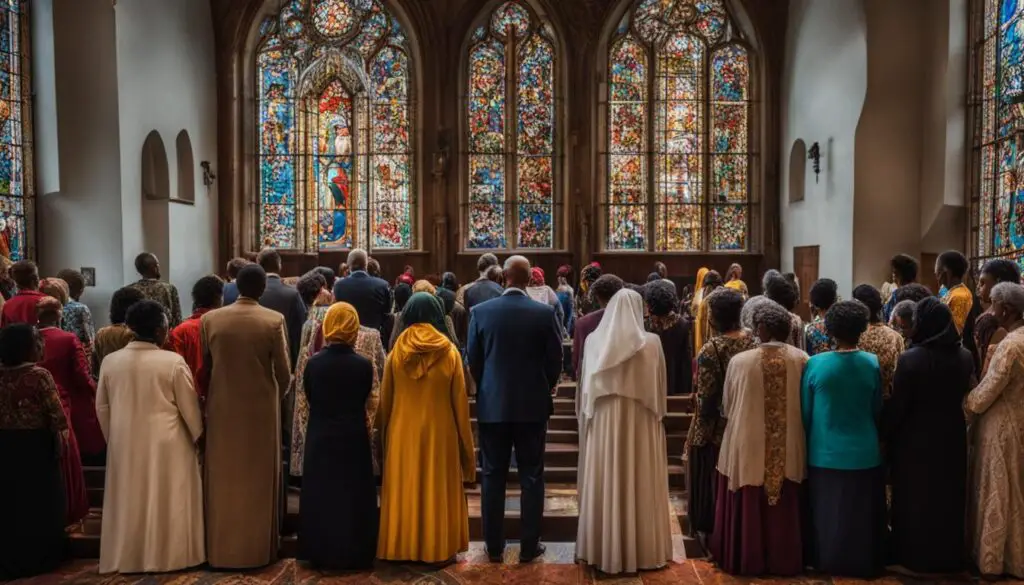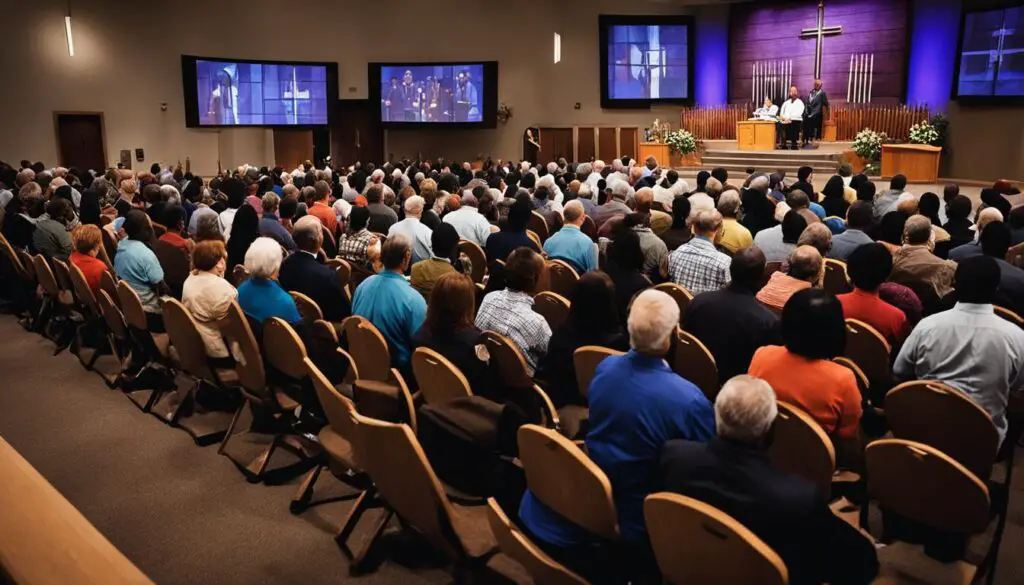The Church of the Nazarene has a rich history rooted in the Wesleyan-Holiness tradition and a global mission. It was founded in the early 20th century through the merger of various associations of local churches. The principal founder, Phineas F. Bresee, had a vision of propagating Christian holiness, leading to the establishment of a denomination that would become a worldwide movement.
From its humble beginnings with just 200 churches in 1908, the Church of the Nazarene has grown exponentially and now includes over 30,000 churches spread across more than 160 countries. This growth is a testament to the denomination’s commitment to spreading the message of Christ and building communities grounded in his teachings.
Key Takeaways:
- The Church of the Nazarene was founded in the early 20th century and has roots in the Wesleyan-Holiness tradition.
- Phineas F. Bresee, the principal founder, emphasized the propagation of Christian holiness as a core mission.
- The denomination has experienced remarkable growth, expanding to over 30,000 churches in more than 160 countries.
- The Church of the Nazarene is dedicated to spreading the message of Christ and building communities centered on his teachings.
- It is a global movement that aims to impact lives and make a positive difference in the world.
Beliefs and Doctrines
The Church of the Nazarene holds firm to a set of beliefs and doctrines that are deeply rooted in Wesleyan theology and the holiness movement. These core principles guide the denomination’s understanding of God, salvation, and the Christian life.
Central to the Church of the Nazarene’s beliefs is the concept of holiness, which is seen as both a transformative work of God’s grace and a lifelong endeavor for believers. The church teaches that through the power of the Holy Spirit, Christians can experience victory over sin and grow in Christlikeness.
The denomination believes in the authority of the Bible as the inspired and inerrant Word of God. Scripture serves as the final authority for faith, belief, and practice.
The Church of the Nazarene upholds the doctrine of salvation, emphasizing the need for personal repentance, faith in Jesus Christ, and the regeneration and sanctification work of the Holy Spirit. The church teaches that salvation is freely offered to all people and can be experienced through a personal relationship with Christ.
Another important aspect of the church’s beliefs is its views on Christian living. The Church of the Nazarene encourages its members to live holy lives that are characterized by love, purity, humility, and compassion. It promotes ethical behavior, personal integrity, and social justice.
The following table provides an overview of some of the key beliefs and doctrines of the Church of the Nazarene:
| Beliefs and Doctrines | Description |
|---|---|
| Holiness | The pursuit of holiness through the indwelling presence of the Holy Spirit. |
| Bible | The authority of the Bible as the inspired and inerrant Word of God. |
| Salvation | The need for personal repentance, faith in Jesus Christ, and the sanctifying work of the Holy Spirit. |
| Christian Living | The call to live holy lives characterized by love, purity, humility, and compassion. |
These beliefs and doctrines shape the teachings and practices of the Church of the Nazarene, guiding its members in their pursuit of spiritual growth and devotion to God.

Sacraments and Rituals
The Church of the Nazarene places great importance on sacraments and rituals that are deeply rooted in Christian tradition. These practices serve as significant expressions of faith, providing opportunities for worship, reflection, and spiritual transformation.
The Sacrament of Baptism
The sacrament of baptism holds immense significance within the Church of the Nazarene. It is viewed as an outward sign of an inward transformation, symbolizing an individual’s identification with Christ.
Through baptism, believers publicly declare their faith, repentance, and commitment to following Jesus. It represents a new birth and a spiritual cleansing, marking the beginning of a journey of faith.

The Lord’s Supper
Another sacrament recognized and practiced by the Church of the Nazarene is the Lord’s Supper, also known as communion. This sacred ritual holds deep meaning for believers as they come together to remember and reflect on the sacrifice of Jesus Christ.
During the Lord’s Supper, participants partake in bread and wine (or grape juice) as symbols of Christ’s body and blood. It is a time of solemn remembrance and communion with God, reaffirming the believer’s relationship with Christ and the covenant they share as part of the Christian community.
Additional Rituals
Beyond the sacraments of baptism and the Lord’s Supper, the Church of the Nazarene also practices other meaningful rituals that are integral to the spiritual life of its members.
One such ritual is foot washing, which serves as a humbling act of service and an expression of mutual love and care within the community of believers. It is a reminder of Jesus’ example of servant leadership and the call for humility and compassion.
Additionally, the denomination incorporates the practice of anointing with oil during times of prayer and healing. This symbolic act represents a sincere plea for God’s intervention, comfort, and restoration.
These sacraments and rituals, deeply rooted in Christian tradition, provide believers with opportunities to connect with God, express their faith, and experience spiritual transformation. They are integral components of worship and help foster a deeper understanding of the Christian journey within the Church of the Nazarene.
Leadership and Clergy
In the Church of the Nazarene, leadership and clergy play a crucial role in guiding and shepherding the denomination. At the helm is a board of general superintendents, comprised of elected individuals who oversee the activities and provide spiritual leadership for the entire church.
These general superintendents are supported by district superintendents, who provide guidance and support at the regional level. Together, they ensure the smooth functioning and growth of the Church of the Nazarene.
The clergy, including pastors and ministers, are the heart and soul of the denomination. They dedicate themselves to the spiritual care and guidance of the church members, serving as compassionate shepherds in their communities.
Through their leadership and devotion, the clergy create an environment of love, compassion, and encouragement, fostering a closer relationship with God and nurturing spiritual growth among the congregation. They play a vital role in providing pastoral care, administering sacraments, and teaching the Word of God.
The dedication and commitment of the church’s leadership and clergy are essential in upholding the values, mission, and beliefs of the Church of the Nazarene, ensuring that the church continues to thrive and impact lives for the glory of God.
| Leadership Level | Responsibilities |
|---|---|
| Board of General Superintendents | – Providing spiritual leadership – Overseeing denomination activities – Ensuring the global mission is carried out – Representation of the Church of the Nazarene worldwide |
| District Superintendents | – Supporting local churches and pastors – Facilitating communication between district and general leadership – Offering guidance and support to the local congregations |
| Clergy (Pastors and Ministers) | – Spiritual guidance and pastoral care – Preaching and teaching the Word of God – Administering sacraments (baptism, communion) – Leading the local congregation in worship and prayer – Overseeing church ministries and programs |

Worship Practices
Worship in the Church of the Nazarene is a sacred time of connection, growth, and spiritual transformation. It is a moment to praise, pray, and immerse oneself in the teachings of the Scriptures. The worship services are carefully crafted to facilitate spiritual growth and provide individuals with meaningful encounters with God.
Drawing from the rich traditions of the church, Nazarene worship incorporates various elements that engage both the heart and the mind. Hymns of praise, known for their depth and beauty, are sung to uplift souls and stir devotion. Through the harmonious blend of voices, the congregation unites in worship and glorifies God. It is a time to pour out gratitude and surrender to the divine presence.
The reading of the Bible holds a central place in Nazarene worship. The Scriptures are considered the authoritative guide for faith and practice, and their teachings are deeply respected. Through the reading of passages and the proclamation of God’s Word, congregants are inspired, challenged, and encouraged on their faith journey.
Preaching is an integral part of worship. Nazarene pastors, guided by the Holy Spirit, deliver sermons that illuminate the Scriptures and offer practical application for daily living. These messages speak to the hearts of believers, guiding them in their spiritual walk and inspiring them to pursue a life of love, holiness, and service.
Prayer, both individual and communal, forms a vital aspect of Nazarene worship. It is a time to bow before God, seeking His guidance, comfort, and transformative presence. In prayer, the community bears one another’s burdens, intercedes for the needs of others, and surrenders individual concerns to God’s loving care.
A Welcoming Atmosphere for Spiritual Growth
Central to Nazarene worship is the desire to facilitate spiritual growth and nurture individuals in their relationship with God. Each service is designed to create a sacred space where worshippers can encounter the divine, experience His grace, and be transformed by His love.
Through worship, Nazarenes are invited to deepen their understanding of God’s Word, inspired to live out their faith in their daily lives, and equipped to impact the world around them. It is a time for personal introspection, spiritual reflection, and a call to action.
By engaging in worship practices, individuals in the Church of the Nazarene embark on a journey of spiritual growth, guided by the Holy Spirit. Through uplifting hymns, biblical teachings, powerful sermons, and heartfelt prayers, worshippers are encouraged to draw closer to God and experience His transformative power.
| Key Elements of Nazarene Worship | Benefits and Outcomes |
|---|---|
| Singing hymns of praise | Fosters a sense of unity and reverence, uplifting hearts, and stirring devotion. |
| Reading of the Bible | Deepens understanding of God’s Word, provides guidance in faith, and fosters personal growth. |
| Preaching | Inspires and challenges individuals to live out their faith, offering practical application for daily life. |
| Prayer | Create a deeper connection with God, offering solace, intercession, and surrender. |

Sacred Texts
The Church of the Nazarene upholds the significance of sacred texts in its faith and practice. At the core of its belief system is the Bible, which serves as the authoritative guide for followers of the denomination. The Bible is considered the inspired Word of God and is held in high regard for its spiritual teachings, moral principles, and historical narratives.
Through the study and application of the Bible, members of the Church of the Nazarene seek to deepen their understanding of God’s will and purpose for their lives. The sacred texts within the Bible serve as a source of guidance, wisdom, and inspiration as individuals strive to live out their faith in accordance with the teachings of Jesus Christ.
One of the significant aspects of the Church of the Nazarene is its commitment to the Articles of Faith. These articles outline the denomination’s core beliefs and provide a theological framework for interpreting the Bible. Within the Articles of Faith, members of the Church of the Nazarene find a comprehensive summary of the essential doctrines and principles guiding their faith journey.
| Sacred Texts | Description |
|---|---|
| Bible | The Bible holds the utmost importance in the Church of the Nazarene, serving as the authoritative guide for faith and practice. |
| Articles of Faith | The Articles of Faith outline the core beliefs and theological understanding of the Church of the Nazarene. |
Denominations and Sects
The Church of the Nazarene is part of the Wesleyan-Holiness movement, a dynamic and diverse branch of Christianity that encompasses various denominations and sects. These groups share similar beliefs and commitments to holiness, seeking to live out the teachings of Jesus Christ in their daily lives.
While the Church of the Nazarene has its distinct identity and organizational structure, it also recognizes and cooperates with other Christian denominations and sects in advancing God’s kingdom. This collaboration is driven by a common commitment to spreading the message of hope, love, and salvation through Jesus Christ.
This spirit of unity and collaboration is essential in a world where the challenges and complexities of modern life require a united effort from believers across different traditions. By working together, denominations and sects within the Wesleyan-Holiness movement can have a greater impact on society, addressing issues such as poverty, inequality, injustice, and the spiritual needs of individuals and communities.
Through dialogue, cooperation, and shared mission, denominations and sects within the Wesleyan-Holiness movement can inspire and support one another in their pursuit of holiness, helping more people experience the transforming power of God’s love.

Key Denominations in the Wesleyan-Holiness Movement
| Denomination | Founded | Membership |
|---|---|---|
| Church of the Nazarene | 1908 | 2.5 million |
| Free Methodist Church | 1860 | 350,000 |
| Church of God (Anderson) | 1881 | 250,000 |
| Pilgrim Holiness Church | 1897 | 10,000 |
| Wesleyan Church | 1843 | 400,000 |
Community and Outreach
The Church of the Nazarene exemplifies a deep commitment to community and outreach, actively seeking to serve and uplift individuals and communities both locally and globally. It is a church that believes in the power of Christian love and compassion to make a difference in the lives of those in need.
Through its extensive network of congregations and ministries, the Church of the Nazarene reaches out to people from all walks of life, providing a supportive and caring community where individuals can find hope, healing, and spiritual growth. In this spirit of inclusivity, the church welcomes individuals of diverse backgrounds and lifestyles, embracing the core message of Christ’s love for all.
Engaging in Global Mission
The global mission of the Church of the Nazarene is at the heart of its outreach efforts. With a presence in over 160 countries, the denomination actively engages in missions work, striving to share the message of the Gospel and bring hope to those in need. Through partnerships with local communities, ministries, and organizations, the Church of the Nazarene tackles issues such as poverty, inequality, and injustice, working towards a more just and compassionate world.
From building schools and medical clinics to providing clean water and food security, the Church of the Nazarene’s outreach initiatives are designed to address the holistic needs of individuals and communities. By meeting physical, emotional, and spiritual needs, the church aims to empower individuals to thrive and reach their full potential.
Making a Difference Locally
The Church of the Nazarene understands the importance of making a difference in its local communities. Congregations actively organize and participate in various community development initiatives, such as food drives, homeless shelters, and youth programs. These efforts are driven by a desire to manifest God’s love in practical ways, fostering strong relationships and nurturing a sense of belonging within the community.
>
“We believe that the Church of the Nazarene exists to be the hands and feet of Jesus in the world, reaching out with compassion, grace, and mercy to those who need it most.” – Rev. Sarah Thompson, Church of the Nazarene
The Church of the Nazarene seeks to fulfill its mission of spreading the Good News by demonstrating the message of Christ through acts of service and kindness. By engaging in community and outreach activities, the denomination strives to create a world where individuals are valued, supported, and empowered to live fulfilling lives.
Architectural and Artistic Features
The Church of the Nazarene is characterized by a rich diversity of architectural and artistic features that reflect the cultural and historical context of each local congregation. These features serve to enhance the worship experience and create a reverent and welcoming atmosphere within the church buildings.
“The beauty of the Church of the Nazarene’s architectural and artistic features is a testament to our dedication to honoring God through art and design,” says Reverend James Wilson, a pastor in the Church of the Nazarene. “Each church building tells a unique story and provides a worship space that inspires spiritual growth.”
Churches in the Church of the Nazarene may incorporate various architectural styles, ranging from traditional Gothic designs to contemporary structures. These architectural features not only contribute to the aesthetic appeal of the buildings but also serve practical purposes such as optimizing acoustics and maximizing natural light.
Artistic features within the church buildings can include stained glass windows, intricately carved woodwork, and beautifully painted murals depicting biblical scenes. These artistic elements serve as visual reminders of the Christian faith and contribute to the overall ambiance of the worship space.
Local Cultural Influence
Many churches in the Church of the Nazarene also integrate elements of local art and culture into their architectural and artistic features. This approach helps to establish a sense of connection between the church and the surrounding community, creating a place of worship that resonates with the local congregation.
“By incorporating local art and culture into our church buildings, we celebrate the unique identity and heritage of our congregation,” explains Reverend Sarah Thompson, a member of the Church of the Nazarene. “This not only fosters a sense of belonging but also provides opportunities for cultural exchange and appreciation within our church community.”
Fostering Worship and Spiritual Reflection
The architectural and artistic features of Church of the Nazarene buildings aim to create an environment conducive to worship and spiritual reflection. Careful attention is given to design elements such as lighting, seating arrangements, and the placement of focal points, all of which contribute to a meaningful worship experience.
“Our goal is to create a worship space that allows individuals to engage with God on a personal level,” states Reverend Emily Phillips. “Through thoughtful architectural design and artistic features, we strive to foster an atmosphere of reverence, enabling worshippers to connect with the divine.”
“The architectural and artistic features of Church of the Nazarene buildings remind us of the majesty and beauty of God’s creation,” says Reverend John Davis. “They serve as a visual representation of our devotion to worship and inspire us to seek a deeper connection with God in our worship services.”
The architectural and artistic features of the Church of the Nazarene play a vital role in creating a sacred space for worship and spiritual growth. They not only reflect the individuality and cultural context of each congregation but also serve as inspiring reminders of the faith and devotion of the church community.
Contemporary Issues and Challenges
Like any religious organization, the Church of the Nazarene faces contemporary issues and challenges. In a rapidly changing world, one of the key challenges is adapting to cultural changes while staying true to core beliefs and values. The Church of the Nazarene strives to strike a balance between cultural relevance and biblical integrity, seeking ways to effectively communicate the timeless message of hope and salvation to a diverse and ever-evolving society.
Addressing social justice issues is another pressing concern for the Church of the Nazarene. In a world grappling with inequality, poverty, and injustice, the denomination is committed to standing up for the marginalized and oppressed. It seeks to actively engage in efforts to promote equality, advocate for social change, and extend compassion to all, reflecting the love and teachings of Jesus Christ.
Maintaining relevance in the face of rapid societal and technological developments is an ongoing challenge for the Church of the Nazarene. As the world becomes increasingly interconnected and digital, the denomination acknowledges the need to leverage technology and adapt ministry approaches to effectively engage with a digital generation. Embracing innovative methods of outreach, worship, and discipleship, the Church of the Nazarene continues to explore ways to connect with individuals and communities, sharing the transformative power of the gospel.
Through these and other challenges, the Church of the Nazarene remains steadfast in its commitment to its mission: to make Christlike disciples in the nations. With a foundation firmly rooted in the Wesleyan-Holiness tradition and guided by its core beliefs and principles, the denomination seeks to draw upon its rich heritage while embracing the opportunities and challenges of the present. By maintaining its dedication to following Christ and His teachings, the Church of the Nazarene strives to navigate contemporary issues with wisdom, grace, and cultural relevance.
FAQ
What is the history of the Church of the Nazarene?
The Church of the Nazarene was founded through the merging of various associations of local churches in the early 20th century. It is grounded in the Wesleyan-Holiness tradition and has a global mission.
What are the beliefs and doctrines of the Church of the Nazarene?
The Church of the Nazarene’s beliefs and doctrines are rooted in Wesleyan theology, which emphasizes the possibility of a victorious life through the indwelling presence of the Holy Spirit. The denomination is part of the holiness movement, which focuses on the pursuit of holiness and a life dedicated to God.
What are the sacraments and rituals of the Church of the Nazarene?
The Church of the Nazarene recognizes two sacraments: baptism and the Lord’s Supper. Baptism is seen as an outward sign of an inward transformation and symbolizes a person’s identification with Christ. The Lord’s Supper, or communion, is a time of remembrance and reflection on Christ’s sacrifice. The denomination also practices other rituals such as foot washing and anointing with oil in times of prayer and healing.
How is the Church of the Nazarene led?
The Church of the Nazarene is led by a board of general superintendents, who are elected to oversee the denomination’s activities and provide spiritual leadership. They are supported by district superintendents and pastors at the local level. The clergy play a vital role in the spiritual guidance and pastoral care of the members.
What are the worship practices in the Church of the Nazarene?
Worship in the Church of the Nazarene is a time of praise, prayer, and learning from the Scriptures. It incorporates elements such as singing hymns, reading of the Bible, preaching, and prayer. The worship services aim to facilitate spiritual growth and provide opportunities for individuals to connect with God.
What are the sacred texts of the Church of the Nazarene?
The Church of the Nazarene views the Bible as its authoritative guide for faith and practice. It believes in the inspiration and inerrancy of the Scriptures. The denomination’s Articles of Faith outline its core beliefs and provide a basis for theological understanding and interpretation of the Bible.
How does the Church of the Nazarene relate to other denominations?
The Church of the Nazarene is part of the Wesleyan-Holiness movement, which encompasses various denominations and sects that share similar beliefs and commitments to holiness. While the Church of the Nazarene has its distinct identity, it also recognizes and cooperates with other Christian denominations in advancing God’s kingdom.
How does the Church of the Nazarene engage in community and outreach?
The Church of the Nazarene places a strong emphasis on community and outreach. It seeks to serve and care for the needs of individuals and communities, both locally and globally. The denomination actively engages in missions, social justice, and community development initiatives to share the message of Christ’s love and compassion.
What are the architectural and artistic features of Church of the Nazarene buildings?
The architectural and artistic features of Church of the Nazarene buildings vary but often reflect the cultural and historical context of the local congregation. Some churches may have traditional Gothic or contemporary designs, while others incorporate elements of local art and culture. The worship space is often designed to create a reverent and welcoming atmosphere.
What are the contemporary issues and challenges faced by the Church of the Nazarene?
Like any religious organization, the Church of the Nazarene faces contemporary issues and challenges. These may include adapting to cultural changes, addressing social justice issues, and maintaining relevance in a rapidly changing world. The denomination strives to navigate these challenges while remaining faithful to its core beliefs and mission.
















